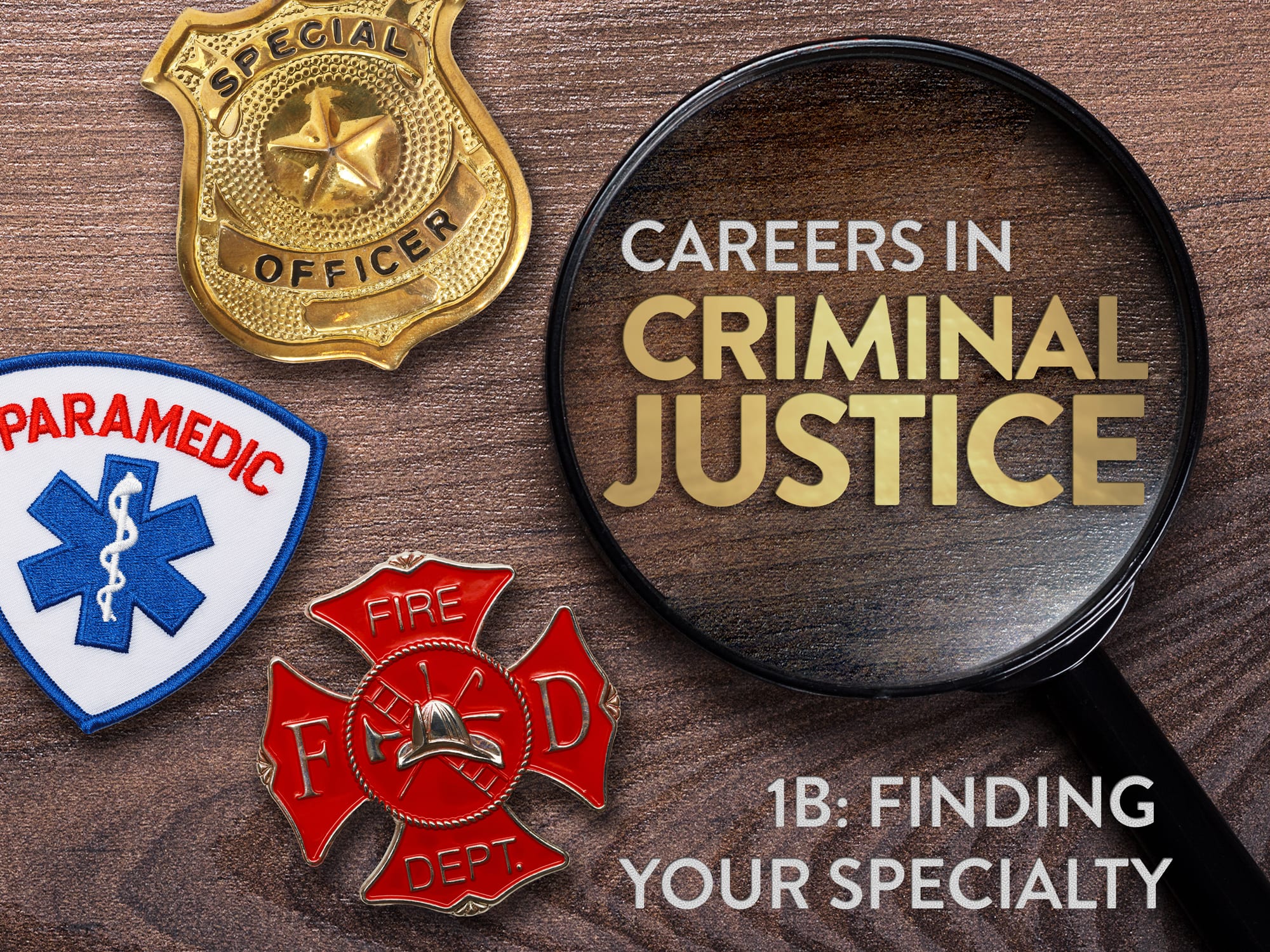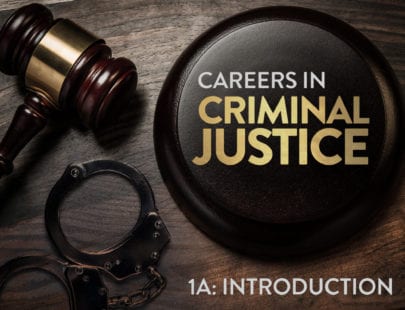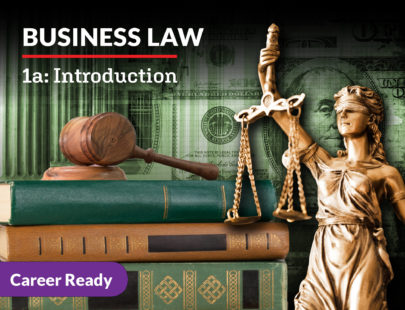
Careers in Criminal Justice 1b: Finding Your Specialty
Have you ever thought about a career as a police officer, an FBI or DEA agent, or any occupation that seeks to pursue justice for all? Careers in criminal justice can be found at local, county, state, and federal levels, and even in the private sector. Explore some of the various occupations in this field, while simultaneously learning how they interact with each other and other first responders. Discover various interviewing techniques to uncover the truth. Understand the importance of making ethical decisions, and how you need to keep your sense of right and wrong in check to be successful in this field.
Units at a Glance
Unit 1: The Role of Private Security
Since the beginning of time, people have been looking for unique ways to protect themselves and their property. But believe it or not, government-funded police forces have only fulfilled that role for a short portion of our history! From something called the Pinkerton Agency to the Secret Service, private security is an integral part of American history.
What will you learn in this unit?
- Compare and contrast public security agents to private security workers
- Recall the history of private security in both ancient and modern societies
- Identify career opportunities available in private security and their responsibilities
- Characterize special investigative units such as the Secret Service and its role in security
Unit 2: Other Roles in Criminal Justice
If you’re interested in the criminal justice field but don’t plan on working patrol, don’t fret. There are many different jobs and career progression opportunities that will allow you to work in a field you’ll enjoy without having to go a traditional route. From border security chaplains to aviation enforcement agents, who knew that so many criminal justice roles existed?
What will you learn in this unit?
- Summarize the role of a SWAT team member
- Analyze similarities and differences between detectives and private investigators
- Understand the different roles and responsibilities of the US Border Security and its divisions
- Recall the purpose of the United States Drug Enforcement Agency (DEA)
Unit 3: Working with Medical Emergency and Fire Departments
EMS and fire service play important roles in keeping communities safe across the nation. Choosing a career in either of these fields requires training and certification, and students who wish to pursue these careers can join several agencies and organizations to prepare them for these careers. Overall, public agencies such as fire, EMS, police, court corrections, and security systems must work together to ensure communities are safe for the families that populate them.
What will you learn in this unit?
- Describe the role of emergency medical services in public safety
- Explain the duties and responsibilities of firefighters
- Research and participate in community and student organizations
- Examine the roles and responsibilities of first responders
Unit 4: Global Perspective: Collaborating with INTERPOL
INTERPOL operating on a global basis is one of the most important aspects of international public safety. These special agents are responsible not only for helping catch criminals but also for providing valuable resources to member countries’ law enforcement departments to help fight international crime. This organization comes from a long history of technological advancements, status changes, and more. Overall, a career in INTERPOL is a rewarding and meaningful one.
What will you learn in this unit?
- Explain the goal of INTERPOL
- Describe the history of INTERPOL
- Discuss the different job roles that exist within INTERPOL
- Identify how INTERPOL collaborates with law enforcement agencies to stop international crime
Unit 5: Spotlight on Interrogation
Interrogation plays an important role in law enforcement. When used correctly, it has the potential to develop relationships and solve crimes. In order for this process to be productive, police officers must build rapport with their communities and use effective communication techniques. When executed properly, interviews and interrogations will assist law enforcement in the pursuit of the truth and help avoid wrongful convictions.
What will you learn in this unit?
- Describe interview techniques used by law enforcement
- Determine how establishing rapport can benefit police officers in their jobs
- Explain how police officers effectively communicate with suspects and inmates
- Identify elements of wrongful conviction and resources for victims of wrongful conviction
Unit 6: Evaluating Ethics in Criminal Justice Systems
Ethics is an important part of the criminal justice system because the actions people take ensure that members abide by the moral obligation of their role. They make daily decisions that need to be fair and equal to all. It is also important to understand how the public is protected by laws, regulations, and policies when members of the criminal justice system act unethically. But these aren’t the only ethical considerations involved in the criminal justice system. We will also look at the death penalty, solitary confinement, and the incarceration of elderly individuals.
What will you learn in this unit?
- Discuss both perspectives of common ethical quandaries in the criminal justice field such as the death penalty or solitary confinement
- Understand the codes of ethics for the criminal justice system and specifically law enforcement officers
- Explain laws, regulations, and policies that govern criminal justice professionals
- Analyze how constitutional laws impact law enforcement officials and their actions
Unit 7: Communication in Criminal Justice
You’ve probably heard a police officer say, “10-4” or spell out a name or address such as “Nora-Ida-Charles-King.” Why do they do this? And what does it mean? Nearly all career fields have their own languages, so to speak, and the field of criminal justice is no exception. Although good verbal and nonverbal communication skills can be helpful in almost any line of work, there are specific communication skills, vocabulary, and even special “codes” necessary for success in criminal justice. We will look at many of the skills and special equipment that law enforcement officers and others in the criminal justice field need to do their jobs efficiently and effectively.
What will you learn in this unit?
- Explain the purpose and demonstrate the use of communication codes and the phonetic alphabet
- Describe different equipment and protocols used by law enforcement officers to communicate with each other and the public
- Identify communication and jurisdictional problems that may arise as multiple agencies work together
- Identify the unique interpersonal skills required in communicating with inmates, coworkers, and the general public
Unit 8: Finding Employment in Criminal Justice
There are many job opportunities available in the criminal justice system for those who are interested in the field and willing to do what is required to earn the necessary qualifications. We’ll discuss the steps one needs to take in order to prepare for, locate, evaluate, and apply to job opportunities in this competitive job arena. But simply landing the job isn’t the end of this process. You’ll also need to think about what it takes to be a good employee and what to do if you decide to change career fields in the future.
What will you learn in this unit?
- Identify sources of information for employment and training opportunities and career options in the field of criminal justice
- Conduct a job search and identify the training, experience, and other qualifications required for different positions
- Complete a job application, resume, and cover letter
- Apply effective job interview techniques
- Describe how to make job changes appropriately
Required Materials
Physical
- Blank paper
- Pencil/pen
- Audio recording device
- Video recording device
Software
- Presentation software
- Word processing software
- Kahoot(free online account)
- Collage creation software
Other
- Family member or friend to act as a “witness” and “interviewer”
Optional
- Video editing software




